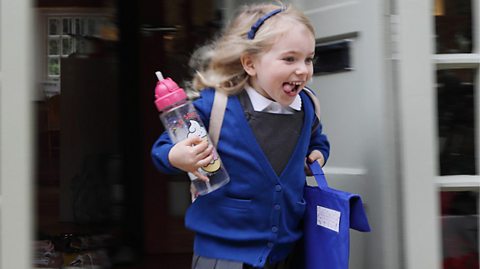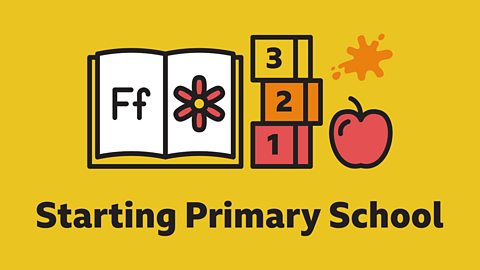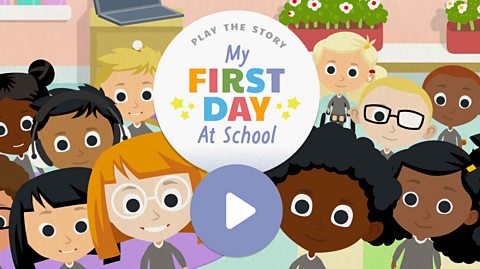
So, youÔÇÖve been offered a primary school place for your child. YouÔÇÖre one step closer to seeing them off at the gates, sending them on to the next big stage of their life. But thereÔÇÖs a whole lot of time between now and then. WhatÔÇÖs next?
Well, preparation is key and we've got some top ideas you can try right now to help sure your child is all set up and happy ahead of the big day!
But, if you aren't entirely happy with the place your child has been given, weÔÇÖve got some advice just for you - including information on appeals.
When do parents find out offers? - See when parents find out primary school places and which school has offered a place to their child.


If you aren't sure about your child's school place

Now that you've received your child's school place, whether it was your first choice or not, here are some steps to consider.
1. Be positive
It's natural to worry about how your child will get on at the primary school they have been offered, especially if it wasn't your first choice, but remember to stay positive, optimistic and open to change
"Be assured that most schools are incredibly warm, friendly, and caring places full of fun and laughter." - Dave McPartlin, Headteacher of Flakefleet Primary School.
You'll find in the majority of cases that there really is nothing to worry about.
2. 'Accept the place'
You may be unsure whether to accept the place you have been offered. Here is parenting blogger, and mum of three, Nilly Dahlia's opinion.
"I know it sounds strange, but even if you don't want your child to attend the school you've been offered - accept the place. You can still appeal, if it comes to that, but you don't want to risk not having any place confirmed come September." - Nilly Dahlia.

3. Join the waiting list
Even if you missed out on your first choice, as tens of thousands do every year, there may still be an opportunity for your child to attend that school. Simply contact the school or the admissions authority to request to join their waiting list.
Where your child will sit on the waiting list is subject to the same factors that were considered during admissions - including how far you live from the school in question, but if a place becomes available and your child is at the top of the list, then you will receive an offer.
Waiting list details and priorities often vary from school to school, so contact your admission authority to find out about your area.

How to appeal
If you have missed out on your first choice school your impulse may be to appeal the decision, but it is not a straightforward process.
"Most appeals are unlikely to succeed - families need to prove that the admissions criteria were not applied correctly, or that they are illegal. Infant class sizes are limited to 30 children (25 in Scotland) and appeals panels are usually reluctant to exceed this number unless there are exceptional circumstances. Parents need to be very clear about why they wish to appeal, based on facts rather than emotions." - Dave McPartlin, Headteacher of Flakefleet Primary School.
Possible reasons for a legitimate appeal of a decision could include; a child moving into the area, having an undisclosed medical issue, or an EHCP (Educational Health Care Plan).
The details on how exactly you can appeal should be included in your allocation letter - if not, contact your admission authority directly. Be sure to make a note of the appeals deadline.
When you appeal, the authority will arrange an independent hearing or tribunal which will decide whether your appeal is accepted or rejected. These hearings can take place online or in-person, so check with your local council to see which way theyÔÇÖd like you to attend.
For more information on primary school appeals in your local area, see below.

Things you can do before school starts
Build their independence
Building your child's independence is the best thing you can do at home before they start school. Of course, children will be in all sorts of stages of their development during the first months of Reception, so it's important not to worry too much about how your child will compare, but remember to encourage healthy routines well before they start.
This ranges from a good sleep routine to using the toilet properly. It can also include communication skills, like listening and speaking
Keep the conversations flowing
Frequently talking and listening to your child improves their social and emotional abilities, setting them up perfectly for participating and learning in the classroom, as well as making friends. They will also be more likely to approach you with any thoughts or feelings they have as a result of going to school, which is a great way to manage their mental health and something you will be thankful for in years to come.
Not only that, your child will pick up words and phrases used in conversation for their own vocabulary, improving their chances of a head start in literacy when it comes to the classroom - but be careful what you say around them! For more ideas on how to develop your child's communication skills, here are 23 tips from early years specialist Anjali Patel.
Ease the transition
There are things you can try while you're both at home to do away with any pre-school jitters. Some parents use their child's teacher's name around the house as a way to make meeting them on the first day a little less intimidating, for example, and while it might not be possible to visit the school or meet the teachers before they start, make the most of what is on the internet, such as the school's website or social media accounts. You could even plot and plan your journey into school using online maps.
If you want a fun way to introduce your child to the classroom environment and its routines, play the My First Day at School game together!
Get excited!
This is a very exciting time for your child - a big step in their life. It's difficult to predict how they will react to the change, but remember: be positive. If you speak positively about starting school, no matter what your own experience was, that will give them the best chance of a happy start.
Of course, this is a very exciting time in your life too, and it will go very quickly. Enjoy it and think of everything you have to look forward to!
For further information check out the rest of which has lots of ways to help prepare children for different aspects of school life ÔÇô both practically and emotionally.
This article was first published in March 2020

More from ┤¾¤¾┤½├¢ Bitesize Parents' ToolkitÔǪ
Parents' Toolkit
Fun activities, real-life stories, wellbeing support and loads of helpful advice - we're here for you and your child.

What to do when you donÔÇÖt get your first choice of school
Parent and social media blogger Nilly Dahlia has advice on what to do if you don't get the primary school place you want.

More Starting Primary School videos and articles
Head to our homepage to help you and your child prepare for starting primary school and thrive in school life.

Game - My First Day at School
Explore with your child what their first day of school might be like and play some classroom activities.

How to help with the transition to school
Al Ferguson, the founder of the Dadsnet gives some advice for helping your child transition from home life to school life.

Five tips to support the after-school ÔÇÿmeltdownÔÇÖ
Expert advice on how to cope with after-school restraint collapse as a parent.
